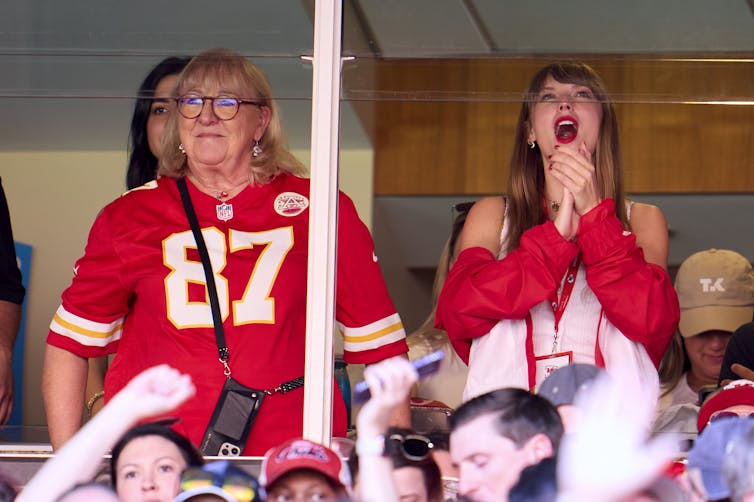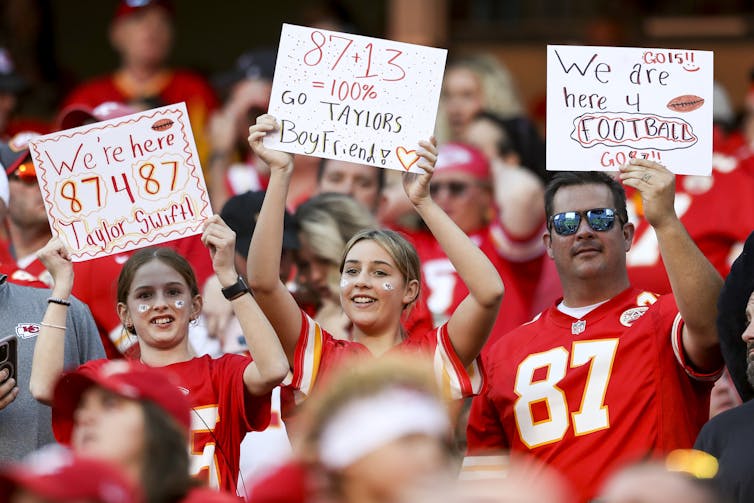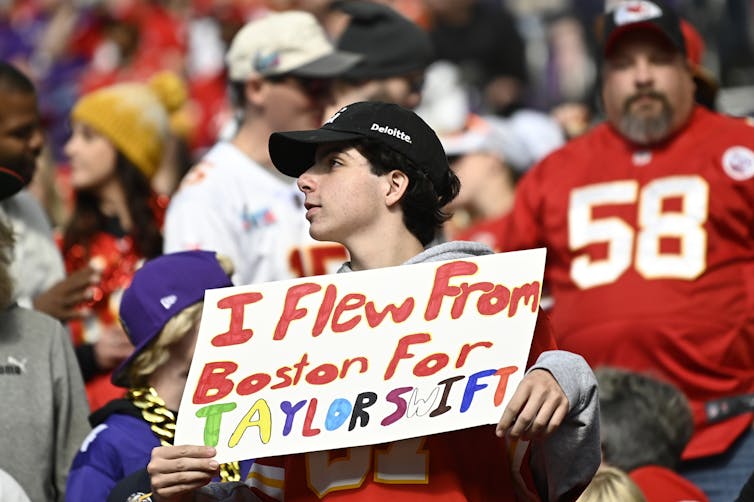5 marketing lessons from the Taylor Swift and Travis Kelce romance
What happens when you unite the biggest pop star in the world and a two-time Super Bowl champion? A whole lot of excitement, as the romance of Taylor Swift and Travis Kelce has shown. But amid all the cheering, canoodling and Instagram flirting, the situation lends some useful insights into marketing – and as an expert in sports marketing, I know that this is a topic worth focusing on. Here are five lessons the NFL and other experiential marketers can consider to enhance their brands and reputation.
1) “Blank Space”: Embrace audience expansion
“Cause you know I love the players … And you love the game!” – “Blank Space,” 2014
Great entertainment marketers know how to fill a blank space. And Swift has given the NFL a unique opportunity to expand its appeal to a demographic – young women – that may not have been interested in football before. Swifties, as Swift’s fans are known, are eager to see the pop icon embrace being in love. So whenever she visits a stadium to cheer on her new lover, Kansas City Chiefs star tight end Kelce – which she has done four times in the past two months and may well do again soon – a media frenzy follows.
While serious football fans want the focus to stay on football, the NFL is smart to capitalize on this opportunity. After all, Swift is a mega-popular star: She has more charted songs (212), top-10 hits (42) and No. 1 song debuts (five) on the Billboard Top 100 than any other female musician in history.
The Chiefs remain known for their winning ways and star power, and they’re still drawing – and satisfying – their traditional fans. Yet Swift’s presence has brought a more playful tone to the games. The ordinarily serious Chiefs coach Andy Reid has taken to joking about the pair (“I set them up”), while memes about Swift having to leave the stadium in a popcorn machine are a next-level combination of participatory pop culture, celebrity and sports.
Audience expansion is an effective tactic for businesses, as long as marketers don’t alienate old fans by opening up to new ones. And so far, this is paying off for the NFL: Ratings soar when Swift attends a game, and Kelce jersey sales have also skyrocketed. This new interest in the sport is welcome, especially since NFL television ratings among 18- to 35-year-olds had previously shown some declines.

2) “Wildest Dreams”: Capitalize on the many motivations for fandom
“Say you’ll see me again/Even if it’s just in your wildest dreams.” – “Wildest Dreams,” 2014
An entertainment or sports marketer’s wildest dream is to be able to bring in all sorts of fans and deliver on their personal reasons for being there. That’s why marketers are wise to think about “psychographics” in addition to demographic appeals. This means that instead of just segmenting audiences by demographic – such as younger women or college students – marketers tailor their appeals to lifestyles, interests, activities and the way consumers think.
My co-authored research shows that engaged sports fans are motivated by psychological desires such as escape and building self-esteem – everyone wants to be associated with a winner – as well as social motives such as wanting to strengthen in-group bonds and participate in traditions and rituals.
Football is known for intense strategies, masculine bravado and violent hits. So the Swift crossover gives NFL sport marketers an opportunity to attract new fans with different motivations. A good example is when the NFL changed its X (formerly Twitter) bio to “NFL (Taylor’s version)” – a nod to Swiftie in-group identity and humor. New fans who are drawn in by such appeals may become more serious about the sport later.
3) “You Belong With Me”: Let consumers feel like they belong
“If you could see that I’m the one who understands you, been here all along so, why can’t you see? You belong with me.” – “You Belong With Me,” 2008
When it comes to sports, and especially football, some people think that the game isn’t for them. The NFL and the Chiefs now have a unique opportunity to leverage sudden interest from a group of people not known for being football superfans. But to convert them into regular viewers, they’ll need to make sure the newcomers feel a sense of belonging.
A subtle example of this sort of outreach happened when the Chiefs used social media to welcome Swift – and by extension, her loyal fans – to “Chiefs Kingdom.” Similarly, the league has made it abundantly clear that Swifties are welcome in the stands, even if a small yet loud cohort of NFL fans would rather they stay away. This open-mindedness is good for business.

4) “Love Story”: Leverage human co–branding and appeals to fun and fantasy
“You’ll be the prince, and I’ll be the princess/It’s a love story, baby, just say yes.” – “Love Story,” 2008
I study human brands – the people, well known or emerging, who are the subject of marketing, interpersonal or interorganizational communications. In this age of social media, human branding has never been more important. Having a strong personal brand is associated with more endorsements, Google searches, merchandise sales and ticket sales. So Swift and Kelce are reaping the benefits of human co-branding.
What makes these particular human brands so compelling? Many Swifties are invested in Taylor’s romantic life and are cheering for her to find love and one day pick out a white dress. This interest and fantasy takes the form of a parasocial – or one-sided – relationship, where one party invests emotional energy and time, while the other person is unaware of the first person’s existence. While these can potentially become harmful, in most cases parasocial interactions are a source of escape, fun and fantasy.
In an era of negative news and doomscrolling, a story that’s fun and entertaining can be powerful. And research in our advertising and branding book shows that sport marketers are eager to capitalize on positive appeals.


5) “Exile”: Don’t just think locally
“You’re not my homeland anymore/So what am I defending now?” – “Exile,” 2020
A final insight for brands and marketers is to not be constrained by geography. With digital commerce and social media, researchers have become increasingly interested in “faraway fans” who travel long distances to events. In a recent study about professional cycling fanship in sporting-event sponsorship, my colleagues and I found that sport event attendees that traveled from farther away were more invested in the event and more willing to buy merchandise. This has big implications for new fans who may travel to Kansas City to catch a glimpse of Taylor Swift.
The Swift/Kelce relationship and the NFL’s highlighting of it is one example of why it is important not to be hemmed in by geography. As one cardboard sign at a recent Chiefs game in Kansas City proclaimed, “I traveled here to see Taylor Swift!”
theconversation.com




